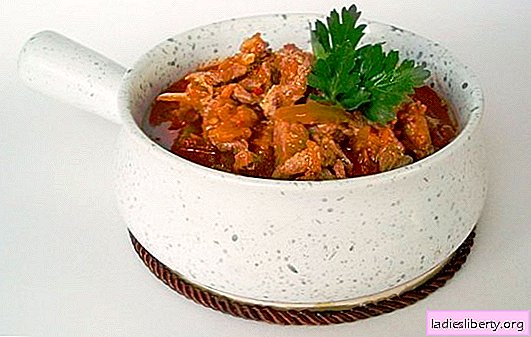
Sunny fruit - oranges have been familiar to us since childhood.
At the sight of this bright orange fruit, a pleasant sourness arises in the mouth.
It is believed that the birthplace of oranges is China, so the Europeans gave the name to this citrus - a Chinese apple.
Oranges: composition as used
The fruits of orange contain up to 85% of the liquid. However, these citrus fruits are beneficial due to their high vitamin C content. Oranges, like their juice, are low in calories. 100 grams contains 36 kcal.
The nutritional value of oranges per 100 grams:
Protein 0.90
Fat 0.20
Carbohydrates 8.20
The use of oranges is diverse, ranging from cooking to cosmetology. Oranges are edible raw, squeezed healing juice from fruits, pulp is added to salads and muffins, biscuits and muffins, fruit zest adds a special citrus flavor to dishes.
Oranges are useful for improving appetite, normalize the digestive system. Sweet and sour pulp of the fetus regulates the secretion of bile. With the help of oranges, you can improve the condition of the liver, eliminate the symptoms of gout. Fans of fatty foods should regularly include citrus in their diet, as the beneficial substances contained in them interact with high-calorie foods, allowing them to digest faster.
A large amount of vitamins is contained in the orange peel, so it can be used to make jelly, stewed fruit, candied fruit.
From the fruits and leaves of an orange tree get essential oil. It has disinfecting, tonic, soothing and analgesic properties.
• Inhalation with orange oil will help to quickly cope with a cold, runny nose, sore throat.
• Ingestion of orange oil positively affects the functioning of the stomach and intestines.
• It also copes with the treatment of dandruff, saves the skin from acne, inflammation, and gives it freshness.
Orange oil can be added to hair masks in order to give them a healthy look. They can be egg-honey, kefir. Orange oil has good penetration. It can be rubbed into the roots of the hair, leaving after that for 60 minutes to absorb, then rinse your head well. After this procedure, the hair will become stronger, gain a healthy shine.
In spring, facial skin often looks tired, begins to peel and become inflamed. Using Orange Oil Face Masks It will help preserve natural moisture in it, accelerate cell recovery, smooth out fine wrinkles, and restore skin tone and elasticity.
• Classic olive mask: mix one teaspoon of olive oil with five drops of orange oil. Apply the nutrient mixture with a cotton pad to the cleansed face and neck, hold for half an hour, then rinse with warm water.
• Banana mask: grind half the banana to a puree state, add a few drops of orange oil. Apply to clean skin for 30 minutes, rinse with water at room temperature after the procedure.
• Firming express mask: beat egg white with a pinch of salt, add 20 drops of almond oil, a few drops of orange oil. Apply to clean skin for 20 minutes, rinse with warm water. Such a mask will quickly smooth out fine wrinkles and tighten the skin. It is good to use it before a responsible date or meeting.
Before using oil from orange, you need to test it for allergic reactions, for example, apply a small amount behind the ear. If the treated area does not turn red within an hour, then the oil can be safely used.
Oranges: what are the benefits for the body?
In oranges, tender and juicy pulp with a pleasant sweetness and an invigorating sour taste. A few slices of fruit will help to improve mood, improve immunity and even help overweight (with regular use).
• Oranges are useful in various cardiovascular diseases. They cleanse and strengthen blood vessels. They can be used as prophylaxis of angina pectoris, stroke, heart attack.
• Tincture of orange peel will help cope with severe pain during menstruation.
• For colds, inhalation with orange oil relieves inflammation in the airways.
• Eating an orange reduces bleeding gums, relieves symptoms of stomatitis.
• One fruit contains a daily dose of vitamin C. They are useful to eat during the cold season, as ascorbic acid strengthens the immune system. The antioxidants contained in it protect cells from aging and damage.
• Vitamins B1, B2, which are part of oranges, improve brain function, help iron to be better absorbed in the blood.
• Oranges are useful to eat along with white veins and films, as these dietary fibers stimulate the digestive system, stop putrefactive processes in the intestine. As a result, the intestinal microflora is normalized, and the removal of toxins is accelerated.
• A large amount of potassium contained in the fruits of the orange tree affects the lowering of blood pressure, improves the functioning of the heart muscles.
Since oranges contain a lot of liquid, they perfectly quench thirst. The use of oranges, orange juice during a party or feast softens the effect of alcohol on the body and nervous system.
Oranges: what is the harm to health?
Since oranges contain a sufficient amount of sugar, they should be used with caution in patients with diabetes. This citrus fruit is not recommended for people suffering from gastritis, stomach ulcers and duodenal ulcers. Acid and sugar affect tooth sensitivity. Therefore, after eating orange or juice from it, it is best to drink a little water or rinse your mouth. All citrus fruits are powerful allergens, so people prone to allergies need to be careful about oranges.
When choosing oranges, you need to pay attention to several signs:
• If a medium-sized fruit is heavy, then it is juicy and sweet. If the fruit is light, it means there is little moisture in it or it is not ripe.
• The most fragrant oranges are usually very sweet.
• For small fruits, the taste is more intense.
• Oranges with a belly button are sweeter than the rest.
• The color of the orange and the thickness of the peel do not indicate its good taste. Less bright fruits with a thin skin often turn out to be tastier than thick-skinned, brightly colored counterparts.
Oranges for kids: healthy or bad?
Many mothers are wondering if oranges are good for children or if they will harm a growing body. Children should not be citrus if:
• allergic reactions to the fruits of citrus trees, allergies to drugs;
• Do not oranges with diabetes.
Some parents begin to give orange juice as a complementary meal from 9 months of age. However, it must be borne in mind that if the crumbs had cases of diathesis or a reaction to any specific products, then citrus fruits can be introduced into the diet only after a year in small quantities. Famous TV presenter pediatrician Komarovsky advises giving children raw fruits, including oranges, from one to two years old, provided good digestion. During feeding, you need to monitor the reaction of the body, at the slightest sign of the negative influence of citrus fruits, you need to abandon them. After a few weeks, try again to give the orange, reducing the dose by half.
Oranges are of great benefit to children with weakened immunity, poor appetite. Orange juice is a tasty and healthy drink. It is best for children to give juice not out of the box, which is sold in stores, but to cook it yourself at home. To do this, rinse several oranges well, cut into halves, squeeze the juice from them. Freshly squeezed juice is recommended to dilute ½ with water. This must be done in order to protect the young stomach from the effects of sour juice. Also, the drink can be diluted with other juices: apple, carrot, pumpkin.
In addition to juice and whole orange, citrus can be added to salads. For example, you can make vitamin fruit and vegetable dessert.
Rinse 2 oranges, peel, cut into small pieces. 2 medium-sized carrots, rinse, peel, grate. Mix oranges and carrots, add 50 grams of washed grapes, sprinkle with lemon juice, sugar, season with low-fat sour cream. Such a delicious dessert will appeal to children to their taste, it is especially useful to give it for an afternoon snack.
Show your child a miracle by growing an orange tree with him. Your baby will be immensely happy by planting his own orange seed. Children are very fond of caring for plants that they themselves planted. Daily observation of the development of a tree forms observation in children, respect for nature, and develops curiosity.











